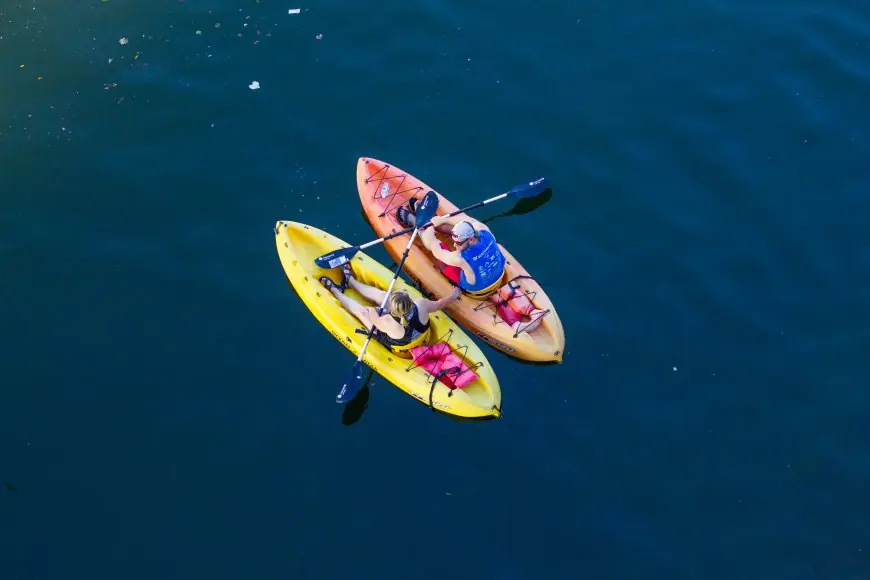The Ultimate Guide to Kayaking Adventures: Rivers, Lakes, and Seas

Kayaking offers an incredible way to explore the great outdoors, providing an intimate connection with nature whether you're paddling on serene lakes, challenging rivers, or the vast open seas. This guide covers everything you need to know about kayaking adventures, including the best locations, essential gear, and tips for beginners and seasoned paddlers alike.
The Appeal of Kayaking
Benefits of Kayaking
Kayaking is not only a thrilling adventure but also a fantastic way to stay fit and healthy. It provides a full-body workout, improves cardiovascular health, and enhances mental well-being by reducing stress and anxiety. Additionally, kayaking allows you to connect with nature, offering a unique perspective on the world from the water.
Types of Kayaking
There are several types of kayaking, each offering different experiences:
- Recreational Kayaking: Ideal for calm waters like lakes and slow-moving rivers.
- Whitewater Kayaking: For adrenaline seekers who enjoy navigating rapids.
- Sea Kayaking: Involves paddling along coastlines and open seas, often for long distances.
- Touring Kayaking: Combines elements of sea and recreational kayaking, often involving multi-day trips.
Kayaking Gear Essentials
Basic Kayaking Equipment
Before hitting the water, ensure you have the following essentials:
- Kayak: Choose based on the type of kayaking you'll be doing.
- Paddle: A lightweight, durable paddle suited to your height and strength.
- Personal Flotation Device (PFD): A life jacket is crucial for safety.
- Helmet: Essential for whitewater kayaking to protect against head injuries.
Safety Gear
Safety should always be a priority. Equip yourself with:
- Whistle: For signaling in case of emergency.
- First Aid Kit: For minor injuries.
- Bilge Pump: To remove water from your kayak.
- Spray Skirt: Keeps water out of the kayak in rough conditions.
Clothing and Accessories
Wear appropriate clothing depending on the water temperature and weather conditions:
- Wetsuit or Dry Suit: For colder waters.
- Water Shoes: Protect your feet from sharp objects.
- Sun Protection: Sunglasses, hat, and sunscreen to protect from UV rays.
Top Kayaking Destinations
Best Rivers for Kayaking
- Colorado River, USA: Known for its challenging rapids and stunning canyons.
- Zambezi River, Africa: Offers a mix of thrilling whitewater and breathtaking scenery.
- Futaleufú River, Chile: Famous for its turquoise waters and world-class rapids.
Top Lakes for Kayaking
- Lake Tahoe, USA: Crystal-clear waters and beautiful mountain views.
- Loch Lomond, Scotland: A mix of tranquil waters and rugged landscapes.
- Lake Bled, Slovenia: Picturesque with a charming island and medieval castle.
Premier Seas for Kayaking
- Norwegian Fjords: Spectacular scenery with towering cliffs and serene waters.
- Mediterranean Sea: Explore coastal caves, ancient ruins, and crystal-clear waters.
- Great Barrier Reef, Australia: Paddle through vibrant coral reefs and marine life.
Kayaking on Rivers
Popular River Routes
- Snake River, USA: Offers a mix of calm sections and exciting rapids.
- Franklin River, Australia: A wilderness adventure through Tasmania's remote forests.
- Soca River, Slovenia: Known for its emerald-green waters and thrilling rapids.
Techniques for River Kayaking
Mastering river kayaking involves:
- Reading the Water: Understanding the flow and identifying hazards.
- Eddy Turns: Using the calm areas behind obstacles to maneuver.
- Bracing and Rolling: Techniques to stay upright and recover from capsizes.
Safety Tips for River Kayaking
- Scout Rapids: Always check rapids before paddling them.
- Paddle with a Group: Safety in numbers, especially in challenging conditions.
- Stay Informed: Be aware of weather conditions and water levels.
Kayaking on Lakes
Scenic Lake Routes
- Lake District, England: A mix of serene waters and rolling hills.
- Crater Lake, USA: Paddle in a volcanic crater with stunning blue waters.
- Lake Geneva, Switzerland: Picturesque views with the Alps as a backdrop.
Techniques for Lake Kayaking
Lake kayaking is generally more relaxed but requires:
- Efficient Paddling: Use proper strokes to conserve energy.
- Navigation: Use landmarks and maps to avoid getting lost.
- Wind Awareness: Be mindful of wind conditions which can create challenging waves.
Safety Tips for Lake Kayaking
- Wear a PFD: Always wear a life jacket, even in calm conditions.
- Check Weather: Avoid kayaking in storms or high winds.
- Stay Close to Shore: Especially if you’re a beginner.
Kayaking on Seas
Coastal Kayaking Destinations
- Vancouver Island, Canada: Rich marine life and stunning coastal scenery.
- Dalmatian Coast, Croatia: Paddle through clear waters and historic sites.
- Maui, Hawaii: Explore sea caves, volcanic coastlines, and abundant wildlife.
Techniques for Sea Kayaking
Sea kayaking requires advanced skills, including:
- Navigation Skills: Use a compass and maps for longer trips.
- Wave Handling: Learn to paddle through and around waves.
- Self-Rescue Techniques: Be prepared to re-enter your kayak in deep water.
Safety Tips for Sea Kayaking
- Plan Your Trip: Ensure you have a detailed route and know the tide schedules.
- Carry Communication Devices: Have a VHF radio or mobile phone in a waterproof case.
- File a Float Plan: Let someone know your itinerary and expected return time.
Planning Your Kayaking Adventure
Choosing the Right Kayak
Selecting the appropriate kayak depends on:
- Type of Water: Flatwater, whitewater, or sea.
- Material: Plastic for durability, composite for performance.
- Size and Shape: Longer kayaks track better, while shorter ones are more maneuverable.
Planning Your Route
Consider the following when planning your route:
- Skill Level: Choose routes that match your experience.
- Distance: Plan according to your endurance and daylight hours.
- Scenic Spots: Include points of interest to enhance your trip.
Packing Essentials
Pack smartly with:
- Dry Bags: To keep your gear and food dry.
- Hydration and Snacks: Ensure you have enough water and high-energy snacks.
- Emergency Gear: A map, compass, and first aid kit.
Kayaking with Wildlife
Best Spots for Wildlife Viewing
- Galápagos Islands: Paddle among sea lions, turtles, and unique bird species.
- Kenai Fjords, Alaska: Spot whales, seals, and puffins.
- Everglades, Florida: Explore mangroves and see alligators and manatees.
Ethical Wildlife Interaction
- Respect Wildlife: Keep a safe distance and avoid disturbing animals.
- Leave No Trace: Ensure you do not leave any litter or damage habitats.
- Observe Quietly: Enjoy the sights and sounds of nature without causing stress to wildlife.
Kayaking for Beginners
Getting Started
For those new to kayaking:
- Take a Lesson: Professional instruction helps build a solid foundation.
- Start Small: Begin on calm, flat waters to gain confidence.
- Rent Before Buying: Try different kayaks to find what suits you best.
Learning Basic Techniques
Essential techniques include:
- Forward Stroke: The basic paddling stroke.
- Sweep Stroke: For turning the kayak.
- Bracing: To maintain balance and prevent capsizing.
Finding Lessons and Guides
Look for:
- Local Kayak Clubs: They often offer lessons and group outings.
- Certified Instructors: Ensure your instructor is qualified and experienced.
- Online Resources: Videos and tutorials can provide valuable insights.
Advanced Kayaking Techniques
Mastering the Roll
A crucial skill for advanced kayakers:
- Eskimo Roll: A technique to right your kayak after capsizing.
- Practice in a Pool: Build confidence in a controlled environment.
- Seek Expert Guidance: Professional instruction ensures proper technique.
Navigating Rapids and Waves
Advanced paddling involves:
- Reading Water: Identify the best routes through rapids and waves.
- Paddle Techniques: Use high and low braces, and draw strokes effectively.
- Group Coordination: Paddle with a team for safety and support.
Expedition Planning
For multi-day trips:
- Detailed Itinerary: Plan daily distances and camping spots.
- Resupply Points: Know where you can restock food and water.
- Emergency Plans: Have a strategy for dealing with unforeseen circumstances.
Kayaking is a versatile and rewarding activity that offers endless opportunities for adventure. Whether you're exploring tranquil lakes, navigating challenging rivers, or paddling along stunning coastlines, the world of kayaking has something for everyone. Equip yourself with the right gear, respect the environment, and enjoy the unique perspectives that only kayaking can offer.







